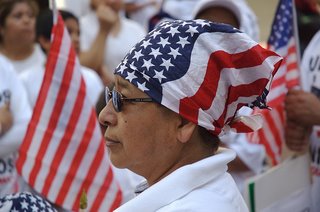 Well, it’s been a busy few days for demonstrations and rallies for good causes. Saturday night saw the nation-wide Global Night Commutes, to draw attention to Uganda’s “night commuters.” Sunday held the Dafur rallies sponsored by Save Darfur. And yesterday over a million turned out for the immigration demonstrations, designed to draw attention to immigration policies and laws and the presence of the 11 to 12 million undocumented immigrants in this country. (Why is that important to this blog? See here and here, for starters.)
Well, it’s been a busy few days for demonstrations and rallies for good causes. Saturday night saw the nation-wide Global Night Commutes, to draw attention to Uganda’s “night commuters.” Sunday held the Dafur rallies sponsored by Save Darfur. And yesterday over a million turned out for the immigration demonstrations, designed to draw attention to immigration policies and laws and the presence of the 11 to 12 million undocumented immigrants in this country. (Why is that important to this blog? See here and here, for starters.)The major newspapers had good coverage this morning. The LA Times reports, “More than a million people turned out for protest rallies across the country Monday, sending a message to lawmakers as Congress continued to wrestle with overhauling the nation's immigration laws.” The same article reports that 400,000 turned out in Chicago, 75,000 in Denver (1/6 of population), and thousands in New York. The Washington Post reports much of the same, adding that 300,000 took part in the LA demonstrations.
Both articles report that the economic impact of the boycotts isn’t certain. My impression is that it was more symbolic than economic. The NY Times touches on this in their article, as well as drawing attention to the wide variety of ethnic groups taking part in the demonstrations:
The demonstrations did not bring the nation to a halt as planned by some organizers, though they did cause some disruptions and conveyed in peaceful but sometimes boisterous ways the resolve of those who favor loosening the country's laws on immigration.Here’s more regarding the boycotts:
Originally billed as a nationwide economic boycott under the banner "Day Without an Immigrant," the day evolved into a sweeping round of protests intended to influence the debate in Congress over granting legal status to all or most of the estimated 11 million illegal immigrants in the country.
The protesters, a mix of illegal immigrants and legal residents and citizens, were mostly Latino, but in contrast to similar demonstrations in the past two months, large numbers of people of other ethnicities joined or endorsed many of the events.
I have been inspired by the large number of people who have responded and shown support for Uganda, Darfur and undocumented immigrants these past few days. I echo Susan’s words about the concern and awareness of the younger generation who slept outside Saturday night. It moves me to see the people speaking up for those suffering in Darfur, who don’t have a voice. And, regarding the immigration demonstrations, I am oh-so-amazed to see so many people expressing non-violent yet passionate cries for a justice they see lacking.Stores and restaurants in Los Angeles, Chicago and New York closed because workers did not show up or as a display of solidarity with demonstrators. In Los Angeles, the police estimated that more than half a million people attended two demonstrations in and near downtown. School districts in several cities reported a decline in attendance; at Benito Juarez High School in Pilsen, a predominantly Latino neighborhood in Chicago, only 17 percent of the students showed up, even though administrators and some protest organizers had urged students to stay in school.
Lettuce, tomatoes and grapes went unpicked in fields in California and Arizona, which contribute more than half the nation's produce, as scores of growers let workers take the day off. Truckers who move 70 percent of the goods in ports in Los Angeles and Long Beach, Calif., did not work. Meatpacking companies, including Tyson Foods and Cargill, closed plants in the Midwest and the West employing more than 20,000 people, while the flower and produce markets in downtown Los Angeles stood largely and eerily empty.
Just last night during my own time of personal Bible reading, I coincidently stumbled on some scripture that I’d heard one of the Christians speakers at the Darfur rally on the Mall quote during a cable news soundbite: “Speak up for those who cannot speak for themselves, for the rights of all who are destitute. Speak up and judge fairly; defend the rights of the poor and needy” (Prov. 31:8-9). God wants us to be aware of the poor and those who are suffering. Even if we disagree about what should be done, it does well to get these issues on the table, to talk about them and our roles as Christians in working through them. Good stuff.
(Image by 1115 at San Francisco rally on May 1; from flikr.com)